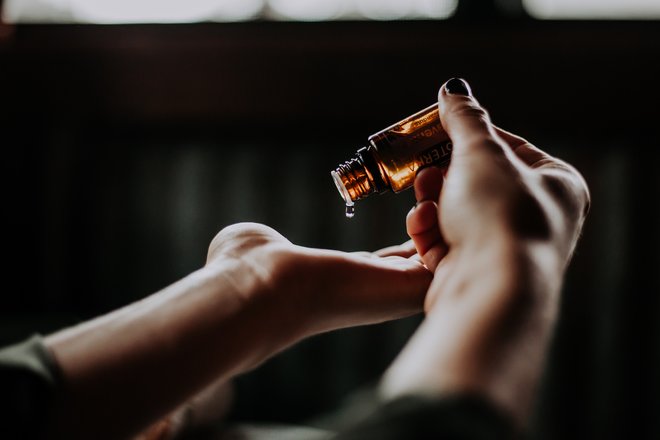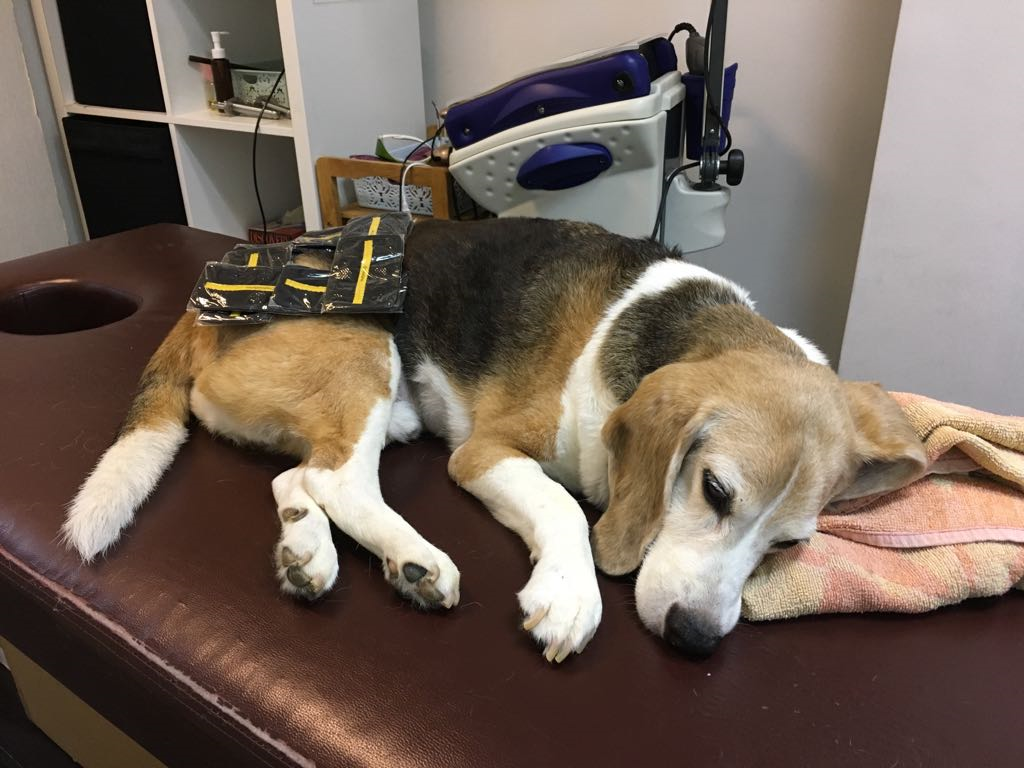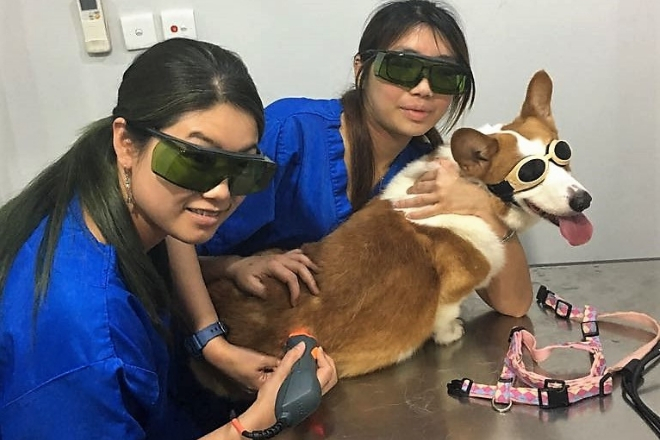By Localiiz
Branded | 17 May 2024
By Localiiz
Branded | 14 May 2024
Copyright © 2025 LOCALIIZ | All rights reserved
Subscribe to our weekly newsletter to get our top stories delivered straight to your inbox.
There's nothing worse than when your beloved fur baby is poorly and you feel helpless to make them better, but luckily Localiiz's very own Stephanie Lown is here to offer some reassuring insight into her own experiences with alternative therapies for pets here in Hong Kong.
In May of this year, my best friend, a 14-year-old beagle named Tigger, whom I had rescued from the SPCA back in 2004, and shared half my life with, was diagnosed with prostate cancer – that dreaded “C” word that every pet owner fears. He was given three to six months, at best – with or without chemotherapy. And at his age, taking on chemotherapy was a slippery slope, and I felt as though the vets had just given my long-term companion a death sentence.I didn't want to lose faith though, and as a result, I threw myself into researching alternative therapies to help alleviate his pain and ensure he had the best quality of life for the time he had left. Some of these therapies helped Tigger enjoy his last few months with us, though unfortunately, prostate cancer has a poor diagnosis in dogs, and in July 2018, his condition dramatically deteriorated and we had to make the difficult decision to help him cross the rainbow bridge.I wish there was something that could have prepared me for the pain I felt in losing Tigger, but at least I can take solace in the fact that I did as much as I could to ensure he was as comfortable as possible, and that I can now share my research on alternative therapies for your pets here in Hong Kong. So, I hope this helps those who are dealing with a similar situation.

Naturopathic approaches to medicine are traditional, natural, and non-invasive. These methods designed to help promote the body's self-healing response, are as follows:
Usually a combination of acupuncture and other Traditional Chinese Medicine (TCM) techniques are used together to help alleviate a range of health issues. It is the excess or imbalance of either Yin (cold) or Yang (hot) energy in the body that leads to illness, so this works to restore the balance of the body’s flow of energy (Qi). Acupuncture restores the balance via the insertion of extremely fine needles at very specific points to stimulate acupressure points and the body’s natural immune response. This method is becoming a more common practise in veterinary medicine, whereas TCM is not as common, despite the fact it has evolved over several thousands of years. Only a few clinics, such as Tin Hau Pet Hospital offers it.When Tigger had slipped a disc in his neck and started showing symptoms such as loss of appetite, lethargy, and difficulty getting around, I carried him to Tin Hau Pet Hospital where Dr. Angela, Dr. Betty, and her assistant, Eileen, treated him with acupuncture – and showered him with plenty of hugs and treats. They then gave us a mixture of powders, pills, and tinctures to take home to be taken orally, several times a day, over the course of two weeks. After treatment, Tigger managed to walk out of the clinic on his own and even selected his own route home, sniffing inquisitively along the way. For the next few days, he gradually regained his strength and managed a few short walks of his choosing. Unfortunately, nothing can really cure cancer, but a combination of acupuncture, TCM, and lifestyle management can certainly help relieve the symptoms. TCM and acupuncture can also aid other problems such as pain, anxiety, arthritis, allergies, digestive problems, and general health maintenance.
Where to find this treatment:Acupuncture and TCM
Tin Hau Pet Hospital, Shop B, G/F, Wilson Court, 41 King's Road, Tin Hau, (+852) 2104 2000
Note: Dr Ann Si-Li works out of Animal Medical Centre, 28 Mosque Street, Mid-levels and G/F Shop No. 4, 31 Luen On Street, Luen Wo Hui, Fanling, New Territories, (+851) 9800 3747
Acupuncture
Happy Valley Veterinary Clinic, G/F, 6 Cheong Ming Street, Happy Valley,(+852) 2572 1291
Four Paws Animal Hospital, 130 Caine Road, Mid-Levels, (+852) 2291 0065
SPCA, Wan Chai & Kowloon Clinics Kowloon Veterinary Hospital, 50 Kai Tak Road, Kowloon City, (+852) 2382 3300
CAU Animal Clinic , 213A Sai Ying Choi Street, North, Prince Edward, (+852) 2777 2878
Casula Veterinary Hospital, Shop G-H, G/F 87-99 Kau Yuk Road, Yuen Long (+852) 2982 2181
Homevet,(mostly house calls in New Territories) (+852) 9860 5522
Pets Central, various locations across Hong Kong

Whilst at Tin Hau Pet Hospital, Dr Betty and Eileen somehow managed to feed Tigger when he had refused almost everything I gave him. They explained that it was because they were feeding him "cooling foods" (foods with Yin energy), in an attempt to restore Tigger's Qi, by decreasing the Yang (heat) – a result of the cancer. It's incredible just how much natural herbs, oils, and foods can do to help us combat illnesses, and this inspired me to dig deeper into Yin / Yang foods, as well as other all-natural supplements. Here are just some examples of natural remedies that are safe for humans and animals:

Aromatherapy makes use of the oils extracted from the bark, leaves, and stems of flowers and plants to improve the physical and psychological wellbeing. Probably the most well known essential oil, lavendar oil is commercially used for its floral tones and calming properties, but did you know that it may also be used to treat menstrual cramps, hair loss, and anxiety? If that's not impressive enough for you, the frankincense has cancer fighting properties, as well as the ability to reduce the effects of chemotherapy, and eliminate cold and flu germs with its antimicrobial properties (to name a few benefits).However, if you are considering treating your pets with aromatherapy, or just enjoy the use of essential oils in your home, make sure you do your research first as not all oils are safe for you to use. For example, cats do not have the ability to process essential oils in their liver, making a majority of oils off limits for them, and tea tree oil is also known to be toxic to dogs too and can cause less than desirable results. To find out more, click here, or check out DK Aromatherapy for their Pets Essence.

Physiotherapy mainly adopts skilled manual therapy, physical therapy, and therapeutic exercise to treat musculoskeletal (bones, joints, muscles, and soft tissues) and neurological conditions in patients. There is a wide range of techniques that can be used in pets such as orthopaedic (bone and joint) injuries and post-surgical traumas, elderly and arthritic pets symptoms, and obesity. Here are just a few examples of clinics that offer the following treatments, although each individual practise may offer various other forms of treatments better suited to your pet.

Osteopathy and clinical massage is a great way to rehabilitate animals suffering from muscular injury or to support orthopaedic issues like arthritis. Benefits include relief from chronic pain or discomfort, immune support, improved circulation, and slowing down muscle atrophy as a result of inactivity or disuse. When Tigger slipped a disc in his neck, you could tell by the way that he held his neck and moved around, refusing to be touched by anyone, that he was in excruciating pain. The next day, we took him to see our osteopath in Tsim Sha Tsui, Cranial Drive, where they used a combination of magnets, laser therapy, and osteopathic adjustments to correct the slip and manage his pain. I breathed a sigh of relief when Tigger was able to rest after his treatment (pictured above).
Where to find this treatment:
Cranial Drive, 7C, Southgate Commerical Centre, 29 Granville Road, Tsim Sha Tsui (+852) 3168 1231
Alessio Savona, Home visits, (+852) 9170 8680
Kowloon Veterinary Hospital, 50 Kai Tak Road, Kowloon City, (+852) 2382 3300

Laser therapy uses invisible infrared light energy to penetrate deep into tissues, to relax muscles and release endorphins to enhance the body’s natural healing. This promotes good blood-flow, moderates inflammation, and enhances cell regeneration as well as the healing of tissue. It can be used to help rehabilitate patients with musculoskeletal pain, tissue swelling, inflammation, muscular strains and sprains, tendonitis, osteoarthritis, and neurological conditions, and to enhance skin wound healing.
At Kowloon Veterinary Hospital, laser treatment is used to relief a pet’s muscles, usually in sessions of 15 to 30 minutes, to pre-empt acupuncture, making the treatment more comfortable if an animal suffers from stiff muscles. It can also be performed on cats (who are particularly receptive), dogs, rabbits and exotic animals. It can be especially effective for spinal diseases such as slipped disks, and in some cases offers a less stressful and affordable alternative to spinal surgery.
Where to find this treatment:
Kowloon Veterinary Hospital, 50 Kai Tak Road, Kowloon City, (+852) 2382 3300
Paws in Motion, Home Visits, (+852) 9357 7541

An example of therapeutic exercise, hydrotherapy makes use of water to facilitate non weight-bearing movements to strengthen muscles and facilitate recovery. Under proper veterinary care, hydrotherapy can improve the quality and rate of healing from traumatic injuries and surgery, improve cardiovascular and muscular conditioning, and aid pain relief and weight loss.We spoke with Wendy Tan, Certified Canine Hydro therapist and owner of HEAL Rehab, Hong Kong’s first purpose-built professional hydrotherapy facility in Sai Ying Pun. She explains that, "The benefits of hydrotherapy include pain relief, increased range of motion, improved cardiovascular fitness, muscle maintenance or strengthening, as well as gait modification or re-training".The team at HEAL swim dogs for both fitness, general maintenance, and rehabilitation, so this is suitable for owners looking for supportive management of a life-long condition (such as hip or elbow dysplasia), conservative or post-operative treatment, or rehabilitation, preventive, or curative options. While their main focus is on hydrotherapy, HEAL was set up as an integrative care centre, dedicated to providing rehabilitative care for domestic animals. As an integrative care centre, they advocate a multi-disciplinary team approach to animal health management and are therefore, mostly, by referral only.
Where to find this treatment:
Heal Rehab, G/F 10 Second Street, Sai Ying Pun, Hong Kong (+852) 2783 7400
Kowloon Veterinary Hospital, 50 Kai Tak Road, Kowloon City, (+852) 2382 3300
SPCA, 5 Wan Shing Street, Wan Chai, Hong Kong (+852) 2802 0501
In loving memory of my bud, Tigger.

Special thanks to Causeway Bay Animal Hospital, Tin Hau Pet Hospital, VSH, Cranial Drive, and the SPCA for taking special care of Tigger while he was around, and to everyone on Hong Kong Dog Owners and Hong Kong Pet Owners who reached out to offer their advice and support during this difficult time. If you are concerned about your pet’s health, please seek the advice of a registered veterinarian.
Read more! Explore the rest of our Pets section on Localiiz.

Top